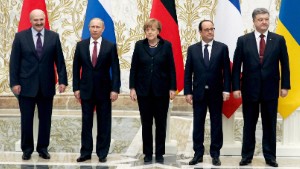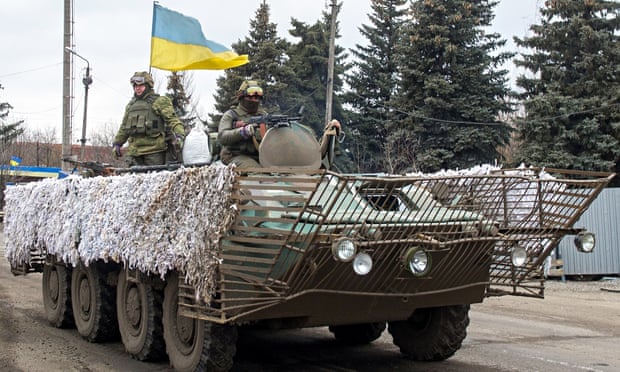By Kathryn Maureen Ryan
Impunity Watch, Managing Editor
KIEV, Ukraine – a ceasefire deal was announced Thursday after more than 16 hours of discussions between the Petro Poroshenko and Vladimir Putin, the leaders of Ukraine and Russia in Minsk, brokered by German Chancellor Angela Merkel and French President Francois Hollande. The ceasefire is due to enter into effect on Sunday. The ceasefire is considered a breakthrough in the 10-month conflict which has claimed the lives of more than 5,000 people, many of them civilians and relations between Russia and the West to their lowest point since the end of the Cold War. German Chancellor Angela Merkel, speaking alongside French President Francois Hollande, said that while more work remained to be done to end the conflict in eastern Ukraine “what we have on the table gives us great hope.” Merkel acknowledged that the agreement is not perfect but argued it is an opportunity for progress in addressing the tensions in the region and is “clearly preferable to the situation if we had done nothing.”

In a joint declaration, released by the German government, the four leaders stated “their full respect for the sovereignty and territorial integrity of Ukraine” and sated that they “firmly believe that there is no alternative to an exclusively peaceful settlement.” The declaration stated leaders “will use their influence on relevant parties” to ensure the package of measures are put into place. “Leaders share the conviction that improved cooperation between the EU, Ukraine and Russia will be conducive to the crisis settlement,” it added.
During a press conference after the Minsk talks, Russian President Vladimir Putin said all parties had agreed to the ceasefire starting February 15 and called for restraint before the ceasefire is set to go into effect. “I call on both sides to end the bloodshed as soon as possible” and come to a political solution to the conflict, he said. Putin argued that the talks between Russia, Ukraine, France and Germany took so long, he said, because authorities in Kiev still refuse to have direct talks with separatists.
United State President Barack Obama issued a statement on the breakthrough ceasefire agreement “The United States welcomes the agreement reached today in Minsk” it said. “The agreement represents a potentially significant step toward a peaceful resolution of the conflict and the restoration of Ukraine’s sovereignty.” However, the United States has continued to expresses concern that the spirit of the accord has been challenged by continued, intense frightening continued in the region.
A Ukrainian military spokesman said around 50 tanks, 40 missile systems and 40 armored vehicles had crossed the border between Ukraine and Russia overnight, accusations that were dismissed by the Putin regime. NATO, however, has said there is overwhelming evidence of Russian military equipment and personnel entering Ukraine but declined to comment on the latest report from the Ukrainian military “The intensity of fighting is evidenced by a sharp increase in the number of people trying to leave front-line towns,” said NATO spokesman Andriy Lysenko.
Ukraine’s territorial integrity and sovereignty was a key issue going into the discussions. Russia annexed the Crimea region of Ukraine last spring, shortly before pro-Russian separatists in the Donetsk and Lugansk regions declared independence from Kiev. “Ukraine will always be a unitary state. No federalization whatsoever! #UnitedForUkraine,” Poroshenko tweeted after the deal was announced. In Facebook post, he said that “we did not agree to a single ultimatum.”
For more information please see:
CNN International – Ukraine Ceasefire Deal Reached After Marathon Minsk Talks – 12 February 2015
The Guardian – Ukraine Ceasefire Aims To Pave Way for Comprehensive Settlement of Crisis – 12 February 2015
National Public Radio – Ukraine Cease-Fire Is Reached, Along With $40 Billion Aid Deal – 12 February 2015
Reuters – ‘Glimmer of Hope’ For Ukraine after New Ceasefire Deal – 12 February 2015



